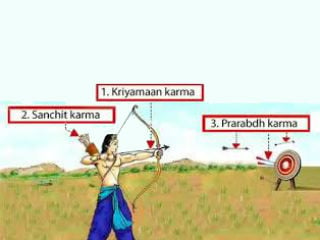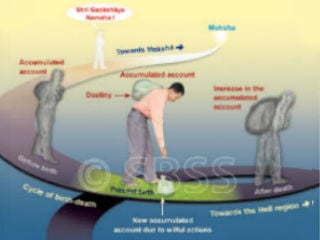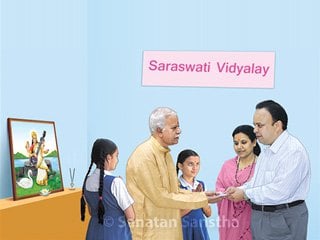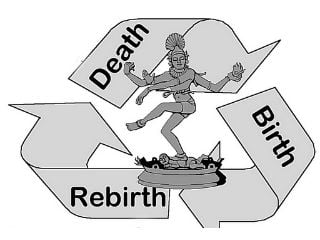Human life is dependent; meaning it is in the grasp of prarabdha (Destiny). Prarabdha means our account of credit and debit (merits and demerits) of several earlier births, in God’s bank. We get what we hold in our account. Even God does not give us what does not belong to us. If we always think on these lines, then sorrow will not grip us while encountering the consequences of prarabdha. Saints are always in a state of Anand (Bliss), however severe their prarabdha may be. We should be able to lead our lives in a similar manner.
1. We will never miss to get what is in our fortune
A. प्राप्तव्यम् अर्थ लभते मनुष्यः, देवोऽपि तं लङ्घयितुं न शक्तः ।
तस्मात् न शोचामि न विस्मयो मे – यद् अस्मदीयं न हि तत् परेषाम् ।। – Panchatantra
Meaning : Whatever an individual is supposed to get (by his good fortune), even God cannot deny him. Hence, I am neither sad nor surprised. What belongs to us can never be someone else’s.
B. The meaning of one of the verses written by the famous Saint Kabir is, ‘Your bread will come looking out for you, so be unperturbed. For, each and every food grain is stamped with the name of the person who is going to consume it’.
2. It is essential to face the
consequences of prarabdha and exhaust them
A. The consequences of prarabdha-karma have to be faced physically. The gross body is the venue. Body organs are the instruments to accomplish it and antahkaran is the one that experiences the happiness-sorrow from consequence of the prarabdha-karma. The effects of prarabdha-karma cannot be overcome without facing the consequences. The Scriptures affirm that only facing its consequence can exhaust prarabdha-karma.
B. In prarabdha-karma, the karma is performed in the past births; but its good or bad consequences are to be faced during this birth. The consequences of demerits of past births, like meeting with an accident, suffering from an incurable disease, incurring huge losses in business etc. are to be faced during this birth. Since which of the demerits of the past births are making us face these sorrowful consequences is not known, we cannot find a solution to avoiding these sorrowful consequences; hence, it is said that the consequences of prarabdha are to be exhausted only by facing them.
3. Even if the mind does not endure the sorrow
due to prarabdha, facing the consequences is unavoidable
Bhishmacharya was the king of a country named Avanti in his earlier (ninth) birth. Once he tossed away a dead chameleon with his spear. The chameleon fell on the thorns of a cactus; hence, in the subsequent birth, Bhishmacharya had to lie on a bed of arrows. When Srikrushṇa told this fact to Bhishmacharya, he did not express any displeasure at lying on the bed of arrows. At that instant, Srikrushṇa relieved him of his pain, yet the suffering of his body continued. This means that, although the feeling of pain in the antahkaran (The inner sense organs consisting of the conscious mind, subconscious mind, intellect and ego) disappeared, the body continued to suffer. In this way, due to the grace of the Guru, his antahkaran was laid to rest, meaning the activation of the attitude ‘I feel happy’ or ‘I feel unhappy’ in the antahkaran stopped.
It was because of inflicting pain upon the creature, that Bhishmacharya had to bear the pain of lying on the bed of arrows in his subsequent birth. By making Bhishmacharya aware of this, Srikrushṇa gave the message to humanity that ‘we have to face the consequences of each demerit earned as per its severity’.
4. One should not forcefully try to change mild prarabdha
Sometimes a student has to join against his will a stream that is not of his liking, due to the insistence of his parents, even though he has interest in some other field or has interest in some other form of art. In such cases, there is a possibility of change of his pre-determined, mild prarabdha. What happens if the predetermined mild prarabdha is altered ? While facing the consequences of mild prarabdha, give-and-take account with others is pre-decided. While facing the consequences of prarabdha as per God’s plan, settling of this give-and-take account is smooth; whereas while enduring mild prarabdha other than that is predetermined, the give-and-take account is settled with a lot of difficulty. In this example, suppose a student becomes a doctor to honour the wishes of his parents, then his give-and-take account with his patients could become a problem for him. Therefore, even if he becomes financially sound, psychologically, he could still be disturbed and restless.

 Using Kriyaman-karma effectively
Using Kriyaman-karma effectively Importance of Kriyaman-karma in overcoming Prarabdha-karma
Importance of Kriyaman-karma in overcoming Prarabdha-karma How to overcome sufferings of Prarabdha
How to overcome sufferings of Prarabdha What is Sanchit-karma and Prarabdha?
What is Sanchit-karma and Prarabdha? Kartavya (Duty) karma
Kartavya (Duty) karma Importance of karma
Importance of karma